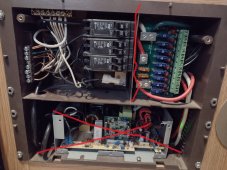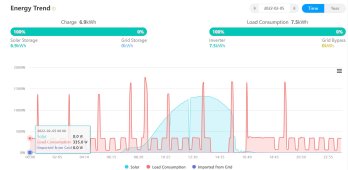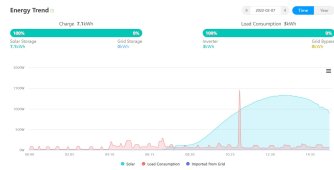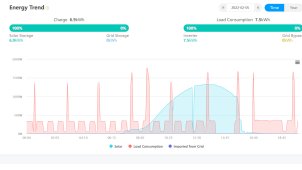edit" Problem was the RV Fridge is a power hog that really should be run on Propane- I left my RV wired as DC-AC-DC. I bought a new fridge, problems solved. Added graphs to show the difference made in case anyone else is considering the switch from RV to residential fridge. I only bought a basic, 350$ unit from Home Depot as it was the same size as my RV fridge (Home Chef 10.1). I have gained a TON of interior space, and the fridge uses a fraction of energy. I am sure there are better residential units to buy, but this fit my needs and was easily obtainable.
Original question: long story short is the loss in efficiency noticeable with the following, or should I just ignore it and save my time and money leaving cables as they are?
I have a 48V system using the Growatt 5000ES Inverters off grid, these put out 240V (this will go into a house once built, otherwise 12V or 24V is probably a better choice). I have the auto-transformer to create the 120V Neutral. I have wired a circuit panel (powered by Growatt/Transformer) to my travel trailer (TT) circuit panel to power the TT. The TT panel connects to a small inverter (this is stock with the system) which converts from AC to DC to power the DC appliances and charge the TT AGM batteries (these were disconnected/ no longer part of the system).
Would it be worth my time to run a wire from the Victron 48V to12V DC-DC converter I already have to my 12V TT appliances instead, so only the 120V portion of the TT is powered by the main Growatt circuit panel....or is the loss not something that I would notice? Right hand side of pic would be fed by 120V, left side by 12V...disconnecting the two and separating them.
Current Setup:
Battery Bank -> Growatt/Transformer -> Main 240V Circuit Panel -> -> 120V Sub Panel -> TT 120V Circuit Panel -> 12V Appliances
While this is probably better, is it worth while?
Battery Bank -> Victron 48V-12V Converter - >12V Appliances

Edit: Here are the graphs that show the improvement from the fridge replacement. As you can see this plays much nicer with my system.
You can see when I finally turned off the electric from the water heater and switched to propane in the evening, RV fridge is still running.

New fridge:

Original question: long story short is the loss in efficiency noticeable with the following, or should I just ignore it and save my time and money leaving cables as they are?
I have a 48V system using the Growatt 5000ES Inverters off grid, these put out 240V (this will go into a house once built, otherwise 12V or 24V is probably a better choice). I have the auto-transformer to create the 120V Neutral. I have wired a circuit panel (powered by Growatt/Transformer) to my travel trailer (TT) circuit panel to power the TT. The TT panel connects to a small inverter (this is stock with the system) which converts from AC to DC to power the DC appliances and charge the TT AGM batteries (these were disconnected/ no longer part of the system).
Would it be worth my time to run a wire from the Victron 48V to12V DC-DC converter I already have to my 12V TT appliances instead, so only the 120V portion of the TT is powered by the main Growatt circuit panel....or is the loss not something that I would notice? Right hand side of pic would be fed by 120V, left side by 12V...disconnecting the two and separating them.
Current Setup:
Battery Bank -> Growatt/Transformer -> Main 240V Circuit Panel -> -> 120V Sub Panel -> TT 120V Circuit Panel -> 12V Appliances
While this is probably better, is it worth while?
Battery Bank -> Victron 48V-12V Converter - >12V Appliances

Edit: Here are the graphs that show the improvement from the fridge replacement. As you can see this plays much nicer with my system.
You can see when I finally turned off the electric from the water heater and switched to propane in the evening, RV fridge is still running.

New fridge:

Last edited:



